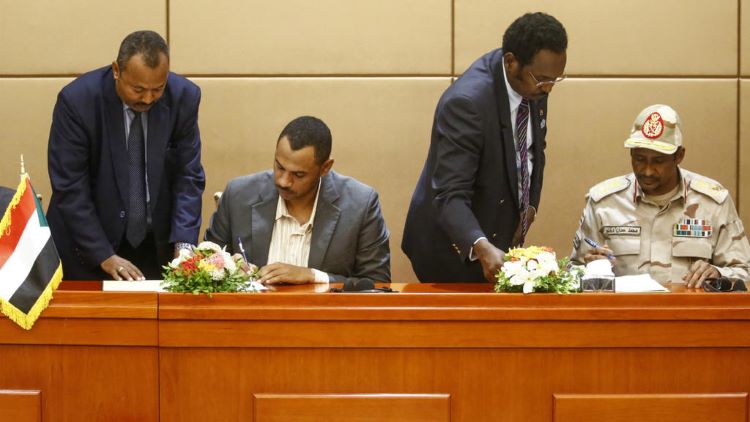SRF groups says Khartoum agreement rejects peace

August 4, 2019 (KHARTOUM) – The Sudanese Revolutionary Front (SRF) Sunday said that the Constitutional Declaration signed by the Transitional Military Council (TMC) and the Forces for Freedom and Change (FFC), “categorically rejected peace.”
The TMC and FFC signed an agreement providing to establish a 39-month transitional authority in Sudan to achieve political and economic reforms before to hold general elections.
The main idea in this deal is to administrate the country during the transitional period by a collegial presidency including military and a technocrat government. The appointed parliament will be open for the political groups that led the revolution to adopt laws needed for a democratic transition.
Last July, the FFC political groups agreed with their allied armed groups of the Sudanese Revolutionary Front (SRF) on a roadmap on ways to achieve peace during the transitional period.
The agreement provides that the Addis Ababa document on peace in Sudan should be added to the political agreement which is the matrix agreement of the transitional period in a way to make possible any amendment on the constitutional declaration.
But in a meeting held on Saturday on to discuss the document, it was decided to redraft the text to make it more flexible to include the armed groups that are not FFC members and to add it to the constitutional declaration, not the political agreement.
In statements on Sunday, SRF leaders rejected the change made by the military council and their allies in the opposition coalition to Addis Ababa text which the FFC vowed to work for its inclusion as it was agreed to the political agreement.
“The Sudanese Revolutionary Front (SRF) presented a project to break Sudan’s historical structural imbalance to establish peace, but it has been disappointed,” said Minni Manawi in a tweet posted on Sunday.
SRF deputy leader Gibril Ibrahim told Sudan Tribune that the constitutional document repealed a very important disposition providing that the would-be concluded peace agreements prevail over any other “charters such as the political agreement and the constitutional document and in a way to amends the constitutional document in accordance with the peace agreement”.
“This provision has been completely rejected. Also, they tied the (future) peace agreements to the constitutional document they agreed to,” he added.
He underscored that; in such a way the peace agreement cannot make any change to the agreed transitional structures which can only be amended by two-thirds of the transitional parliament.
The leader of the Justice and Equality Movement further pointed out that the agreement signed in Khartoum on Sunday cancelled another important disposition providing that the peace document will be between the SRF and the transitional government while the other armed groups can join them if they want.
“What happened is that they said we do not want the name of a Revolutionary Front at all (….) and replaced it by the armed groups,” he said.
According to Ibrahim, this means excluding all the political groups that are part of the SRF from the” political equation”.
The RSF leaders are expected to issue a statement expressing their position on the agreement.
Minnawi said that they held “a lengthy and extensive meeting, during which they decided the formation of political and legal committees to discuss ways to deal with the new situation and to respond to the agreement which « categorically rejected peace”.
“Within hours, we will read the position of the Revolutionary Front,” he said.
Minnawi further praised “The positions of the (FFC) leaders who have truly shown their patriotism … but these leaders have been oppressed by the conservative club,” he said.
It was reported that some FFC leaders had called on add the text of peace document to the political agreement but others stressed that adding it to the constitutional declaration is enough. Also, they rejected any possible increase in the seats of the collective presidency and the transitional government to give positions to the armed groups.
(ST)
